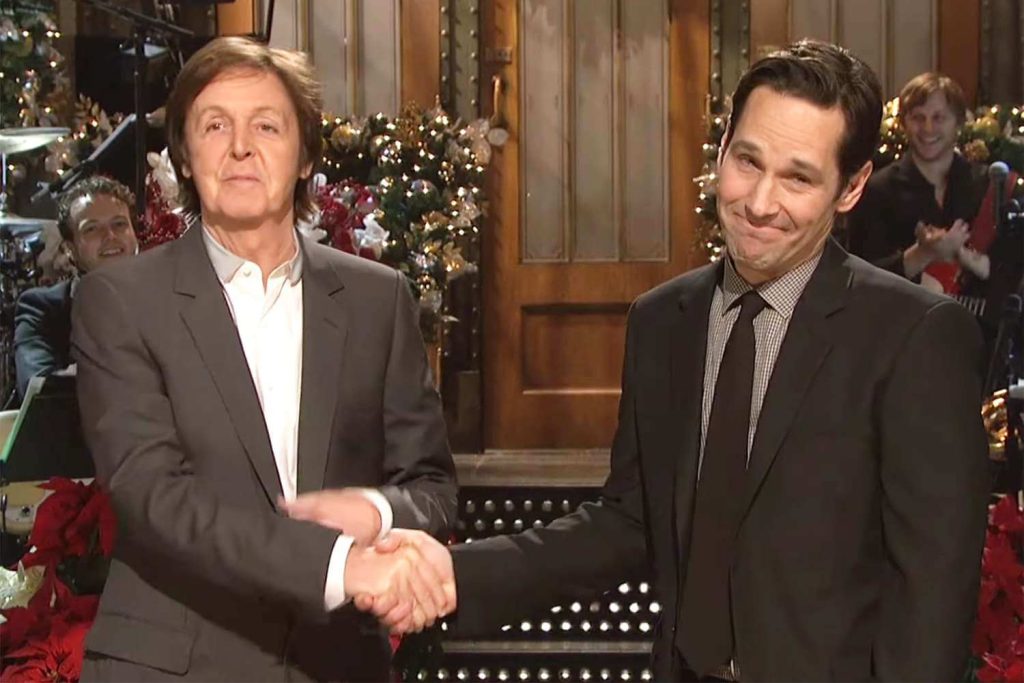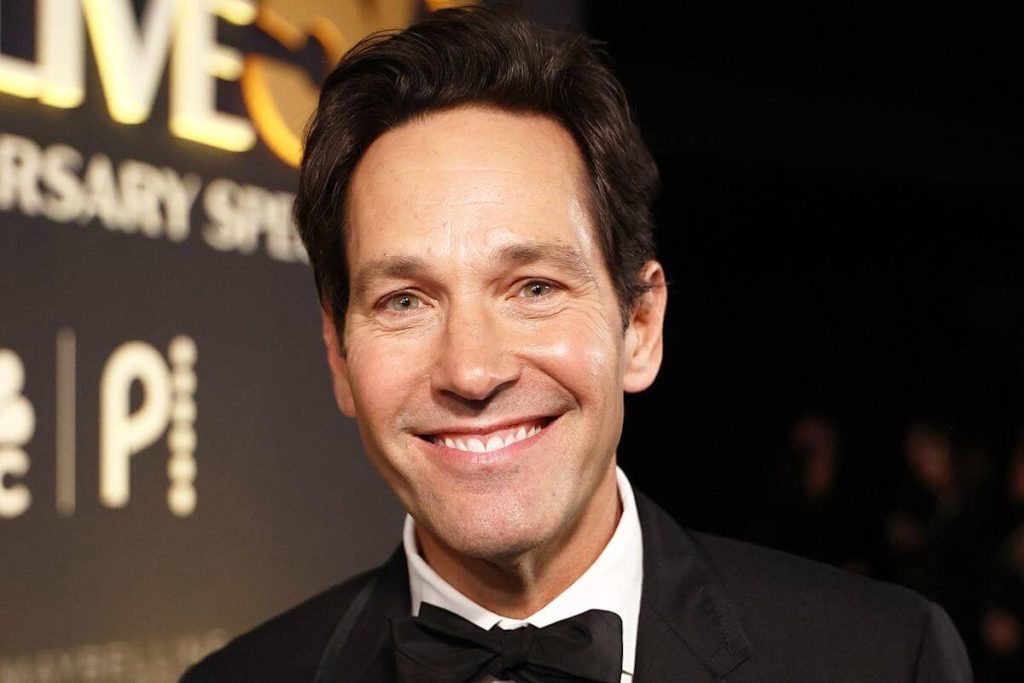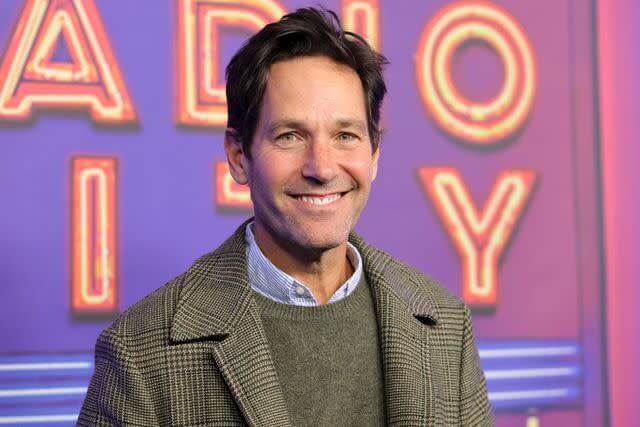World News
Paul Rudd’s Saturday Night Regret: Reflecting on a McCartney Misstep with Heart and Humor
Introduction: When Iconic Moments Haunt the Funniest Minds
Paul Rudd is celebrated for his charm, wit, and humility, but even the most beloved entertainers can find themselves haunted by small moments that linger in their memory. In a recent WSJ Magazine video, Rudd revealed that one such moment has followed him for years—his 2010 Saturday Night Live hosting gig alongside the legendary Paul McCartney. Rudd, part of the show’s esteemed Five-Timers Club, confessed he regrets how he signed off the episode, fearing it may have unintentionally sounded self-congratulatory. What was meant as a humble expression of joy—”This won’t be topped”—was, in hindsight, a source of six months’ worth of sleepless nights. This moment offers a revealing glimpse into the thoughtfulness of a comedic actor known for his humility and self-awareness.

The Goodnight That Lingered: Rudd’s Misinterpreted Words
On December 11, 2010, Rudd stood on SNL’s iconic stage after a memorable show featuring Sir Paul McCartney as the musical guest. Brimming with excitement, Rudd said, “Well, this won’t be topped,” as the credits rolled and McCartney stepped away to perform “Get Back.” In Rudd’s mind, it was a natural, awestruck reaction to sharing the stage with a Beatle. But later, he realized it could be misread as him placing himself on McCartney’s level—something that never crossed his mind at the moment. “It kept me awake at night for six months,” he admitted. The overthinker in him couldn’t shake the worry that his comment had come off as self-important. For fans and fellow performers, Rudd’s worry highlights how even casual comments made in euphoric moments can leave a lasting impact on someone deeply attuned to perception.
Hosting Royalty: Paul Rudd’s SNL Legacy
Rudd’s relationship with SNL is long-standing and impressive. His debut came in 2008 with musical guest Beyoncé, and he’s since hosted four more times—each paired with top-tier musical talent like One Direction, DJ Khaled, and of course, McCartney. He’s also made memorable cameos, including in John Mulaney’s extravagant musical sketch “Moving to New York” during SNL’s 50th anniversary special. Rudd’s ability to mix into different comedic styles and collaborate with various artists showcases his versatility and enduring appeal. Despite the magnitude of his hosting history, the 2010 show remains a personal standout—and not just because of McCartney. It’s a moment that exemplifies how meaningful SNL can be, even to veteran actors, and how seriously they take their time in Studio 8H.

Paul McCartney’s Impact: A Moment with a Beatle
For any performer, sharing a stage with a Beatle is nothing short of a dream. McCartney’s presence on the 2010 SNL episode elevated it from memorable to legendary. Rudd’s excitement was genuine, and his emotional response at the end of the show was born from admiration. “Where do you go from there?” he asked rhetorically, overwhelmed by the experience. The moment reflects just how revered McCartney is—not only by fans but by his peers. Rudd’s comments weren’t about comparing status, but about recognizing the surreal privilege of performing alongside one of the greatest musicians of all time. His honest reflection only adds to the story’s endearing quality, reminding fans of the deep reverence actors like Rudd feel for legends like McCartney.
Anxiety and Artistry: When Comedy and Concern Collide
Paul Rudd’s retrospective guilt reveals the lesser-seen side of comedic performers—their vulnerability. Known for his laid-back persona and impeccable comedic timing, Rudd is often the picture of confidence on screen. Yet, this story offers a glimpse into his inner world, where even a throwaway line can spiral into months of doubt. This intersection of comedy and anxiety is not uncommon. For performers who value humility and authenticity, public perception can weigh heavily. Rudd’s anxiety wasn’t rooted in ego, but in the fear of seeming disrespectful to someone he idolizes. That self-awareness and empathy are part of what makes him so beloved—and it’s also what transforms a simple anecdote into a broader commentary on how artists internalize their public performances.
Letting It Be: Growth, Reflection, and Legacy
Despite his lingering regret, Rudd continues to build on a legacy defined by generosity, sincerity, and talent. This anecdote doesn’t tarnish his career—it enriches it, painting a fuller picture of the man behind the charm. In sharing the story, Rudd reminds us that even seasoned stars carry insecurities, and that growth often comes from the willingness to admit our perceived missteps. Perhaps the real takeaway isn’t about what was said on stage, but about what it means to care deeply about how others receive your words. In a world often quick to criticize, Rudd’s story is a refreshing example of humility and introspection. And as for Paul McCartney? There’s little doubt he took the comment in stride, perhaps never giving it a second thought. But for Rudd—and for fans who love him all the more for it—it was a lesson in self-reflection and grace.
Conclusion: The Comedy of Being Human
Paul Rudd’s SNL goodnight with Paul McCartney is a story that blends excitement, anxiety, and heart—a microcosm of what it means to be human in the spotlight. While many would brush off such a moment, Rudd leaned into it, revealing his sensitivity and respect for the stage, his collaborators, and his audience. It’s a reminder that behind the laughs, even the funniest people carry concerns, overanalyze their actions, and strive to do right by those they admire. In the end, it’s not the words that define the man—it’s the integrity behind them. And in that regard, Paul Rudd continues to shine.
From thedragonfashion


